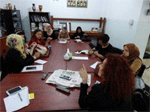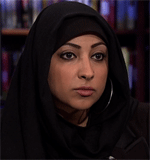Social Watch News
Published on Thu, 2014-10-02 09:36
Last week, the Human Rights Council adopted a resolution condemning the activities of vulture funds for their impacts on the capacity of governments to fulfill their human rights obligations. In a resolution passed with 33 of the votes of members, only 5 countries voting against (United States, Germany, Japan, UK and Czech Republic) and 9 abstentions, the Council held that debt repayment to the aforementioned funds, under predatory abusive conditions, bears a direct negative effect on human rights. |
|
Published on Fri, 2014-09-26 00:00
» |
Published on Thu, 2014-09-25 13:35
The new government of Iraq, announced last September 8 by the new Prime Minister Haider al Abadi was resented by the major organizations of Iraqi women because it includes only one woman among its 25 members (22 ministers and three deputy Pms). The Iraqi Women Network expects more women in decision-making positions, as promised by politicians. “It is unfortunate, says IWN that women remain victims of patriarchal bargains in the distribution of ministerial positions and the consolidation of the policy of exclusion and discrimination against women”. The women activists agreed to continue demanding to increase the share of women in the ministries that still have not appointed ministers, as well as deputy ministers within the cabinet, in the chairmanship of the parliamentary committees and in the presidencies of the independent commissions and boards. |
Published on Thu, 2014-09-25 12:43
In July 2015, the international community will have the chance to change the future of finance development. Governments, civil society, trade unions and other actors will meet for the third UN conference on Financing for Development (Ffd) in Addis Ababa (Ethiopia) to take concrete decisions for the future of development and how to finance it. In the run-up to this crucial meeting, two major reports have been released which are intended to inform the upcoming debates. We have had a report from the Intergovernmental Committee of Experts on Sustainable Development Finance (ICESDF) and one from the Open Working Group (OWG) – a 30-member group nominated by the UN General Assembly to decide on the Sustainable Development Goals. Both reports should feed into future action. Disappointingly, both lack ambition and fail to present specific recommendations, something that CSOs - many in developing countries - and other actors have been calling for some time. |
Published on Thu, 2014-09-25 12:22
The United Nations General Assembly on 9 September adopted by vote the crucial draft resolution of the Group of 77 and China, "A/68/L.57/Rev2: Towards the establishment of a multilateral legal framework for sovereign debt restructuring processes." A majority of 124 countries voted for the resolution, 11 countries voted against it, while 41 countries abstained from a vote. A total of 176 countries out of the UN membership of 193 were present. |
Published on Thu, 2014-09-25 11:59
My last blog post on budgeting for human rights explored the obligation for governments to use the maximum of available resources to realize rights enshrined under the International Covenant on Economic, Social and Cultural Rights (ICESCR). Here we will examine what the obligation of progressive realization means for government budgets. |
|
Published on Fri, 2014-09-19 12:31
» |
Published on Thu, 2014-09-18 14:49
The United Nations General Assembly on 10 September adopted the Sustainable Development Goals (SDGs) outcome document. The resolution of the 68th session of the General Assembly was in line with developing countries' request that the report of the Open Working Group (OWG) on SDGs shall be the main basis for integrating sustainable development goals into the post-2015 development agenda. Meanwhile, the General Assembly recognises that other inputs will also be considered in the intergovernmental negotiation process at the sixty-ninth session of the General Assembly that was convened on 16 September. |
Published on Thu, 2014-09-18 10:21
Emerging social problems have shown that the characteristics of poverty in Thai society are becoming more complex, with differing forms of disparity and inequality. This basic understanding allows seeing the need to build a universal social welfare and protection system in Thailand because the current direction of development has marginalized the majority of the people. This situation has caused these people to become invisible. For example, migrant workers in Bangkok cannot access certain welfare services because their house registration is in the provinces. Therefore children’s problems cannot be resolved in isolation without linking them to other social issues. At the same time, society faces various increasing social, economic and natural disaster risks. There are more exploitative practices in the employment system. This is the situation for the majority of parents and guardians of young children for whom civil society is advocating a basic early childhood welfare system. |
Published on Wed, 2014-09-17 22:08
Human rights defender Ms Maryam Al-Khawaja will face trial on 1 October 2014 before the High Criminal Court for allegedly "assaulting a police officer". Maryam Al-Khawaja, is the acting president of the Bahrain Centre for Human Rights (BCHR) and the co-director of the Gulf Centre for Human Rights (GCHR). |
SUSCRIBE TO OUR NEWSLETTER









